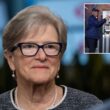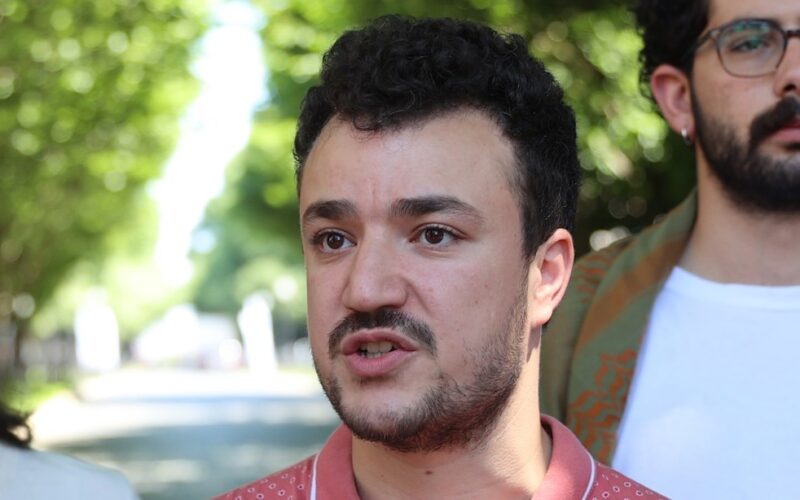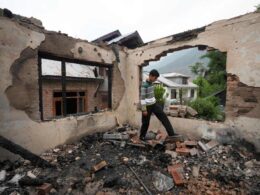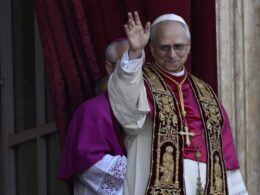Mahmoud Khalil, the detained Palestinian activist who has become the public face of the Columbia University protests, got to hold his newborn child for the first time on Thursday ahead of his next scheduled immigration court appearance, his lawyers told the Daily News.
Khalil’s legal team had sparred with the Trump administration over the government’s refusal to permit the recent graduate to have physical contact with his 1-month-old son, Deen, who was born while Khalil remained in federal immigration custody in Louisiana.
“We had made numerous requests to the facility to permit a visit,” one of his lawyers, Baher Azmy, legal director of the Center of Constitutional Rights, told reporters ahead of their meeting. “[His wife, Dr. Noor Abdalla, and son] endeavored to travel over six hours and 1,500 miles to the place that the government chose to swift Mahmoud off to in the middle of Louisiana, and having made that journey, obviously wanted to meet with her husband and touch him, and allow him to meet his son and touch his son for first time.”
His attorneys had asked a federal judge to intervene.
In court filings, government officials argued such a meeting would effectively grant Khalil a privilege not afforded to other detainees and turn a legal visitation into a family one, which they maintained was unsafe in a secure facility. New Jersey Federal Judge Michael Farbiarz granted the request Wednesday evening.
“It underscores the very deliberate cruelty with which this administration is pulling all stops to maximize its pressure on Mahmoud,” said Ramzi Kassem, co-director of CLEAR and another member of Khalil’s legal team. “It’s not effective, and it is backfiring, but it’s worth highlighting just how brutal and unusual it is and how unfortunate it is that we have to go to federal court.”
The Department of Homeland Security did not immediately return a request for comment.

During the hearing on his immigration case, lawyers for Khalil are expected to ask a Louisiana immigration judge to terminate his deportation proceedings based on recent evidence of alleged misconduct by the Trump administration — including the arrest of Khalil without a warrant.
“We’re asking the immigration judge to declare what the government has done has been outrageous,” said Marc Van Der Hout, one of Khalil’s immigration case lawyers.
That judge, Jamee Comans, ruled last month that the federal government had met its legal burden to deport Khalil. If she stands by that decision and declines to put an end to the proceedings, his legal team said they would present the merits of Khalil’s application for asylum, citing the danger he could face abroad, likely in Syria or Algeria where he was before obtaining his green card in the United States.
Khalil has not been charged with a crime. Instead, top federal officials have argued his presence in the country poses a risk to the administration’s foreign policy interests in combatting antisemitism, an allegation that he denies.
While Khalil’s immigration lawyers seek to put an end to his deportation proceedings, his broader legal team is also challenging his detention on free speech grounds in a New Jersey federal court, where Judge Farbiarz intervened late Wednesday.
It has been more than two months since Khalil, 30, was detained by DHS agents at his Columbia-owned apartment in front of Abdalla, who was then eight-months pregnant, and moved to Louisiana — setting him up to appeal any court orders to some of the most conservative judges in the nation.
In the weeks that followed, the Trump administration has sought to deport several other international student activists, with federal courts repeatedly releasing them from immigration custody while their proceedings continue. Farbiarz has yet to rule on the issue for Khalil.
Khalil, who completed his studies at Columbia’s School of International and Public Affairs in December, would have accepted his master’s degree this week. During his time at Columbia, he served as a negotiator between student protesters and Columbia administrators, and pushed back on descriptions of his role as supportive of Hamas, a U.S.-designated terrorist group. He has repeatedly denounced antisemitism.
With Molly Crane-Newman and News wire services








